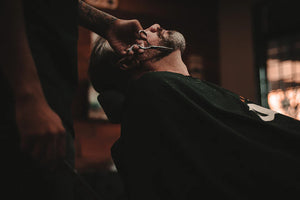Näringens kraft i att förebygga håravfall
Jul 06, 2025
Vanliga frågor
1. Vilken roll spelar näring för hårhälsa?
2. Vilka näringsämnen är viktiga för hälsosam hårväxt?
3. Hur relaterar hårväxtcykeln till näring?
4. Vilka koststrategier kan hjälpa till att stödja hårhälsa?
5. När bör jag söka professionell hjälp angående håravfall?
Håravfall är en vanlig oro som påverkar miljontals människor världen över. Även om genetik och hormonella förändringar spelar en stor roll är näring avgörande för att bibehålla friskt hår och förhindra ytterligare förlust. Genom att förstå de viktiga näringsämnen som behövs för friskt hår och integrera dem i din kost kan du göra betydande förändringar. Denna artikel utforskar näringens roll för hårhälsa, med fokus på hur kosten påverkar håravfall och de extra fördelarna med att använda produkter som FOLIGAIN schampo för tunt hår och Trioxidil.
Näringens betydelse för hårhälsa
Din kost är grunden för friskt hår. Hårsäckarna behöver en mängd näringsämnen för att må bra, och brist på något av dessa kan leda till hårförtunning och håravfall. Viktiga näringsämnen som främjar hårhälsa inkluderar:
- Proteiner: Byggstenarna i håret, proteiner som keratin är avgörande för hårstyrka och tillväxt.
- Vitaminer: Vitaminerna A, C, D, E och B-komplexet (särskilt biotin) stödjer hårväxt och stärker befintliga hårstrån.
- Mineraler: Zink, järn och selen är viktiga för att upprätthålla friska hårsäckar och förebygga håravfall.
- Omega-3-fettsyror: Dessa hälsosamma fetter närar hår och hårbotten, främjar återfuktning och minskar inflammation.
Förståelse för hårstruktur och tillväxt
För att förstå näringens betydelse vid förebyggande av håravfall är det viktigt att känna till hårets grundläggande struktur. Hår består främst av ett protein som kallas keratin, vilket produceras av hårsäckar som finns i huden. När håret växer går det igenom flera faser:
Hårväxtcykeln
- Anagenfas: Tillväxtfasen där håret växer kontinuerligt i flera år.
- Katagenfas: Övergångsfasen som varar flera veckor, där håret slutar växa och hårsäckarna börjar krympa.
- Telogenfas: Vilofasen som varar några månader. Efter denna fas faller håret av och nytt hår börjar växa.
Näringsbrister kan störa denna cykel, vilket leder till ökat håravfall och tunnare hår. En välbalanserad kost säkerställer att ditt hår förblir i optimal tillväxtfas så länge som möjligt.
Viktiga näringselement för att förebygga håravfall
Proteiner
Hår består huvudsakligen av protein, vilket är avgörande för hälsosam tillväxt. Att inkludera kvalitativa proteinkällor, såsom fisk, fågel, bönor och baljväxter, i din kost kan hjälpa till att främja produktionen av keratin, vilket resulterar i starkare och friskare hår.
Vitaminer
Varje vitamin spelar en unik roll för hårhälsan:
- Vitamin A: Stödjer hårbottenhälsa och reglerar oljeproduktionen.
- Vitamin C: Fungerar som en antioxidant och skyddar håret från oxidativ stress kopplad till håravfall.
- Vitamin D: Känd som en hårväxtregulator, en brist kan leda till ökad håravfall.
- Biotin (B7): Ofta kallat 'hårvitaminet', det är avgörande för keratinproduktionen.
Mineraler
Mineraler som järn, zink och selen bidrar också betydligt till hårhälsan:
- Järn: Nödvändigt för att röda blodkroppar ska kunna transportera syre till dina hårsäckar.
- Zink: Bidrar till vävnadstillväxt och reparation, samtidigt som det balanserar hormonnivåer som påverkar hårväxt.
- Selen: Hjälper till att förebygga mjäll och stödjer hårsäckarnas hälsa.
Koststrategier för friskt hår
Balanserade måltider
För att säkerställa att du får i dig tillräckligt med nödvändiga näringsämnen, sikta på balanserade måltider som inkluderar en blandning av proteiner, hälsosamma fetter, fullkorn, frukt och grönsaker. Att inkludera en variation av färger i dina måltider kan naturligt öka näringsmångfalden, vilket gör det lättare att uppfylla dina dagliga behov.
Hydrering
Att hålla sig hydrerad är en annan viktig faktor för att behålla ett hälsosamt hår. Uttorkning kan leda till sprött hår som lätt går av. Sikta på att dricka tillräckligt med vatten under dagen och överväg att lägga till vätskerika livsmedel som gurka, apelsiner och meloner i din kost.

Begränsa bearbetade livsmedel
Bearbetade och sockerrika livsmedel kan störa hormonbalansen och leda till håravfall. Fokusera på hela livsmedel för att vårda din kropp och ditt hår på rätt sätt.
Tillskott för hårväxt
Medan en balanserad kost är grundläggande kan vissa individer vända sig till kosttillskott för extra stöd. Kosttillskott kan ge koncentrerade doser av viktiga vitaminer och mineraler. Det är dock klokt att rådgöra med en vårdgivare innan du påbörjar någon tillskottsregim för att säkerställa att de passar dig.
Hårvårdsrutiner som kompletterar näringen
Utöver kosten kan rätt hårvård förbättra effekten av dina näringsinsatser. Här är några tips att ha i åtanke:
Mild hårtvätt
Att använda milda hårprodukter, såsom FOLIGAIN schampo för tunt hår, kan göra skillnad för att bevara hårhälsan. Dessa specialiserade schampon är utformade för att stärka håret och förbättra hårbottens hälsa, och fungerar bäst i kombination med en näringsrik kost.
Regelbundna hårbottenmassage
Hårbottenmassage stimulerar blodcirkulationen och säkerställer att hårsäckarna får viktiga näringsämnen. Du kan inkludera hårbottenmassage när du applicerar schampo och ge ditt hår den extra omsorg det förtjänar.
Att undvika värmeskador
Att minimera värmeverktyg som kan skada håret hjälper till att bevara dess integritet. Välj istället lufttorkning när det är möjligt, eller använd värmeskyddande produkter om styling är nödvändig.
Sambandet mellan stress och håravfall
Förutom kosten är stress en känd faktor som kan påverka hårhälsan. Höga stressnivåer kan leda till tillstånd som telogen effluvium, vilket orsakar plötsligt håravfall. Att införa stressreducerande tekniker i din livsstil—som yoga, meditation eller regelbunden träning—kan ge betydande fördelar för ditt allmänna välbefinnande, inklusive ditt hår.
När du ska söka professionell hjälp
Om du märker ihållande eller allvarligt håravfall trots ansträngningar att förbättra din näring och hårvårdsrutin, överväg att söka råd från en vårdpersonal eller en hudläkare. De kan rekommendera behandlingar som Trioxidil eller andra terapier anpassade efter dina behov.
Din väg till fylligt hår
Att omfamna en näringsrik kost, tillsammans med effektiva hårvårdsprodukter och en hälsosam livsstil, kan ha en betydande påverkan på hårhälsa och livslängd. Genom att fokusera på näringens kraft hjälper du inte bara till att förebygga håravfall, utan du när också hela din kropp. Kom ihåg att kombinera en balanserad kost med rätt hårvårdsrutiner och tveka inte att rådfråga proffs vid behov. Din resa mot fylligt hår börjar idag!

